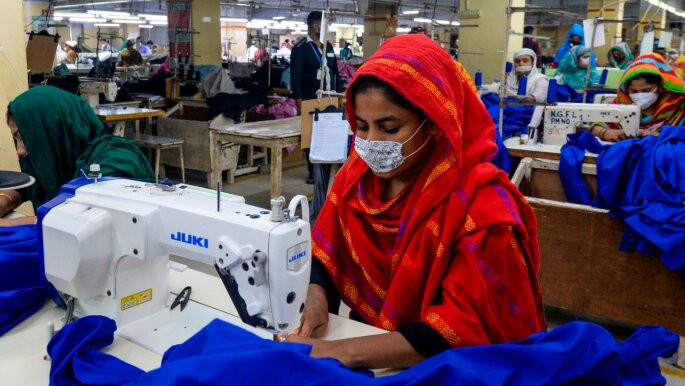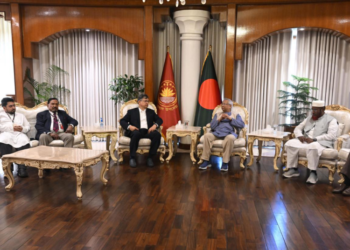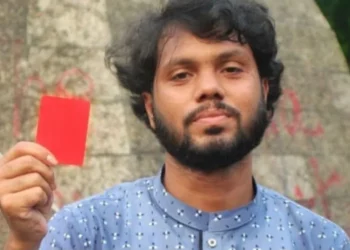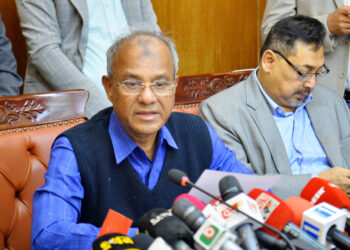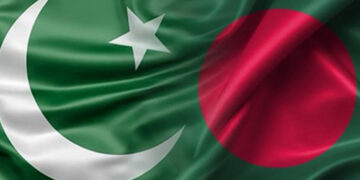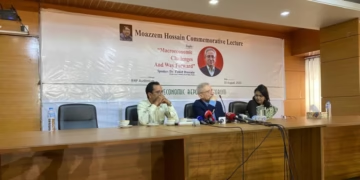The Bangladesh apparel sector could face an additional $250 million in duties every month if the 37% tariff imposed by the United States isn’t permanently lifted. Leaders in Bangladesh’s garment industry have raised concerns that this tariff will significantly impact the country’s export economy, with nearly 1,000 garment factories at risk of closure.
U.S. Tariff Impact on Bangladesh Apparel Sector Exports
Bangladesh’s garment sector, which is one of the country’s key exports, faces a substantial challenge if the U.S. tariffs on Bangladeshi garments remain. Industry leaders have urgently called on the caretaker government to engage in diplomatic discussions with the U.S. to secure a permanent tariff removal.
On April 19, 2025, at the inauguration of the Sammilita Parishad election office and prayer gathering at the Giant Business Tower in Uttara, Dhaka, key industry figures discussed the impact of the U.S. tariff on the Bangladesh apparel sector. Md. Abul Kalam, leader of the Sammilita Parishad panel, recognized the positive step of a temporary 90-day suspension of the 37% tariff but cautioned that the industry needs a permanent resolution.
Bangladesh Apparel Industry’s Response to U.S. Tariffs
The U.S. government imposed a new “Reciprocal Tariff” on several countries, including Bangladesh, as part of an effort to reduce its trade deficit. On April 2, 2025, President Donald Trump introduced tariffs ranging from 10% to 50% on imports, which included a 37% tariff on Bangladeshi garments. In response, Dr. Muhammad Yunus, the chief adviser to Bangladesh’s caretaker government, sent an official letter to President Trump requesting the suspension of these tariffs.
As a result, on April 9, 2025, President Trump temporarily suspended the 37% tariff for a 90-day period, offering brief relief to Bangladesh’s garment exporters. However, Kalam expressed concerns that if the tariffs are not permanently lifted, Bangladesh’s apparel sector could face monthly duties of around $250 million, which would severely affect the industry’s profitability.
Challenges Faced by Bangladesh Apparel Manufacturers
With profit margins in the Bangladesh apparel sector already low averaging just 3-4% the additional burden of the U.S. tariff could lead to the closure of almost 1,000 factories. Industry leaders have also pointed out that while buyers typically pay duties, recent changes in global buying patterns have led to importers shifting these costs onto suppliers, exacerbating the financial strain on Bangladesh’s garment manufacturers.
Read More: Sustainable Business: Shaping a Greener World for the Next Generation
Industry Leaders Call for Diplomatic Action
Faruque Hassan the former president of the Bangladesh Garment Manufacturers and Exporters Association (BGMEA) and chief coordinator of the Sammilita Parishad, emphasized the importance of continued diplomatic engagement to secure a permanent tariff withdrawal. He also urged the international community to consider extending the timeframe for Bangladesh’s graduation from Least Developed Country (LDC) status, which would help provide additional support to the garment sector during this challenging time.
The Need for Strategic Action in the Bangladesh Apparel Sector
Hassan highlighted that while Bangladesh is open to increasing imports, it is crucial for the government to avoid making any unnecessary promises that could affect the long-term stability of the nation’s trade balance. He stressed that the U.S. tariffs were imposed as part of a broader strategy to reduce its trade deficit and that reciprocal tariffs could have resulted in more favorable terms for Bangladesh’s garment exports.
Ensuring the Future of Bangladesh’s Apparel Sector
Kazi Moniruzzaman, president of Sammilita Parishad, concluded the gathering by urging unity and collective action to safeguard the future of Bangladesh’s apparel sector. The ongoing efforts to resolve the U.S. tariff issue are crucial for the stability and growth of the industry, which plays a vital role in Bangladesh’s economy.
Other prominent speakers included BNP leader Zainul Abedin Farroque, Mofazzal Hossain Pavel, president of the Bangladesh Garments Buying House Association, Asif Ashraf, a member of BGMEA’s support committee, and Abrar Hossain Sayem, president of the Bangladesh Apparel Youth Leaders Association (BAYLA).

